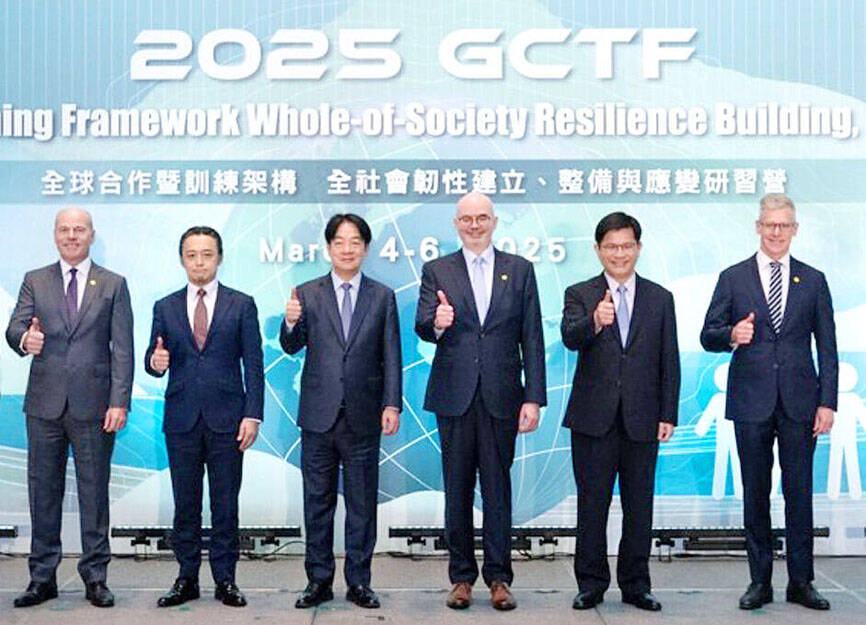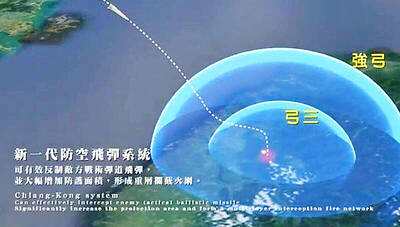Topics set for two upcoming Global Cooperation and Training Framework (GCTF) workshops in Taipei underline the platform’s commitment to addressing critical global issues and the hope of strengthening whole-of-society resilience, the American Institute in Taiwan (AIT) said.
The GCTF forum slated to take place next month is titled “Countering Foreign Information Manipulation and Interference,” while another event scheduled for November is titled “Energy Security.”
The topics demonstrate the GCTF’s commitment to addressing critical global issues, with the aim of strengthening whole-of-society resilience through enhancing energy security, and improving media literacy and effective responses to online threats, an AIT spokesperson said.

Photo courtesy of the Presidential Office
As with all GCTF projects, the two workshops are jointly organized by the AIT, the Ministry of Foreign Affairs, the Japan-Taiwan Exchange Association, the Australian Office in Taipei and the Canadian Trade Office in Taipei, they said.
As this year marks the 10th anniversary of the GCTF, the workshops would continue the tradition of being a vital platform for sharing Taiwan’s experience with the world, facilitating the nation’s cooperation with like-minded partners and forming new solutions in facing common challenges, they said.
GCTF workshops do not address cognitive warfare every year, and this year’s topic choice reflects China’s massive information manipulation over the past few months, Democratic Progressive Party Legislator Puma Shen (沈伯洋) said yesterday.
Foreign information manipulation and interference is a focus of global attention, and the GCTF might have felt that China or other major powers in information warfare are coming up with more methods of information manipulation, he said.
The topic might not be aimed at China, but it is signaling to GCTF members that they should set up a platform among themselves to share intelligence, Shen said.
Countries should not try to understand China’s action in isolation, he said, adding that cross-border collaboration is needed.
Chen Fang-yu (陳方隅), an assistant professor in the Department of Political Science at Soochow University, said the topics were selected possibly because the GCTF considers them urgent, and Taiwan and the US already have a certain degree of research and findings.
The US, across different administrations, has been studying information manipulation and misinformation, and Taiwan, which is at the front line of information manipulation and interference, also has in-depth research findings, he said, adding that the workshops could be an extension of long-standing areas of cooperation.
Since US President Donald Trump came into office, his administration has cut funding to the US Agency for International Development and other programs, but the funding for the GCTF has been steady and supported by the US Congress, Chen said.
The GCTF offers training that is in line with many political agendas and societal demands, he said.
Regarding the workshop on energy security, Chen said the issue is closely linked to defense resilience, as it has a direct impact on energy supply and how to respond to a potential blockade during wartime, adding that it is not necessarily related to Taiwan’s energy policy.

LIMITS: While China increases military pressure on Taiwan and expands its use of cognitive warfare, it is unwilling to target tech supply chains, the report said US and Taiwan military officials have warned that the Chinese People’s Liberation Army (PLA) could implement a blockade within “a matter of hours” and need only “minimal conversion time” prior to an attack on Taiwan, a report released on Tuesday by the US Senate’s China Economic and Security Review Commission said. “While there is no indication that China is planning an imminent attack, the United States and its allies and partners can no longer assume that a Taiwan contingency is a distant possibility for which they would have ample time to prepare,” it said. The commission made the comments in its annual

DETERMINATION: Beijing’s actions toward Tokyo have drawn international attention, but would likely bolster regional coordination and defense networks, the report said Japanese Prime Minister Sanae Takaichi’s administration is likely to prioritize security reforms and deterrence in the face of recent “hybrid” threats from China, the National Security Bureau (NSB) said. The bureau made the assessment in a written report to the Legislative Yuan ahead of an oral report and questions-and-answers session at the legislature’s Foreign Affairs and National Defense Committee tomorrow. The key points of Japan’s security reforms would be to reinforce security cooperation with the US, including enhancing defense deployment in the first island chain, pushing forward the integrated command and operations of the Japan Self-Defense Forces and US Forces Japan, as

INTERCEPTION: The 30km test ceiling shows that the CSIST is capable of producing missiles that could stop inbound missiles as they re-enter the atmosphere Recent missile tests by the Chungshan Institute of Science and Technology (CSIST) show that Taiwan’s missiles are capable of intercepting ballistic missiles as they re-enter the atmosphere and pose a significant deterrent to Chinese missile threats, former Hsiung Feng III missile development project chief engineer Chang Cheng (張誠) said yesterday. The military-affiliated institute has been conducting missile tests, believed to be related to Project Chiang Kung (強弓) at Pingtung County’s Jiupeng Military Base, with many tests deviating from past practices of setting restriction zones at “unlimited” and instead clearly stating a 30.48km range, Chang said. “Unlimited” restrictions zones for missile tests is

NO CHANGES: A Japanese spokesperson said that Tokyo remains consistent and open for dialogue, while Beijing has canceled diplomatic engagements A Japanese official blasted China’s claims that Japanese Prime Minister Sanae Takaichi has altered Japan’s position on a Taiwan crisis as “entirely baseless,” calling for more dialogue to stop ties between Asia’s top economies from spiraling. China vowed to take resolute self-defense against Japan if it “dared to intervene militarily in the Taiwan Strait” in a letter delivered Friday to the UN. “I’m aware of this letter,” said Maki Kobayashi, a senior Japanese government spokeswoman. “The claim our country has altered its position is entirely baseless,” she said on the sidelines of the G20 summit in Johannesburg on Saturday. The Chinese Ministry